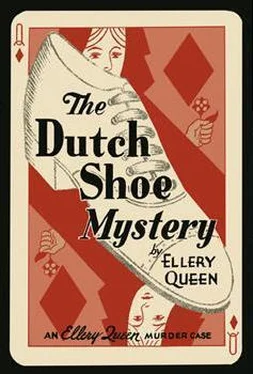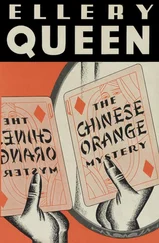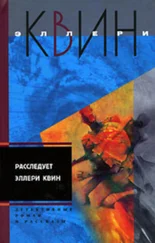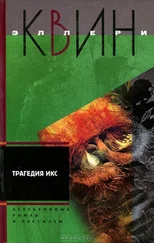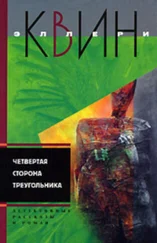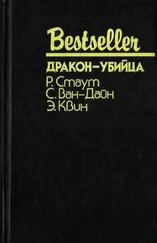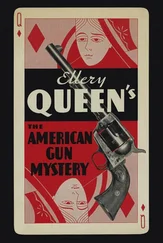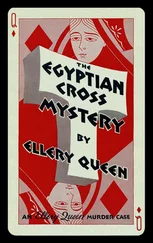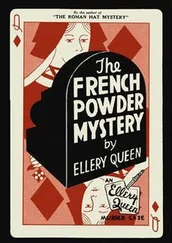Ellery Queen
The Dutch Shoe Mystery
To Dr. S. J. Essenson
for his invaluable advice on certain medical matters
ABIGAIL DOORN a millionairess
HULDA DOORN an heiress
HENDRIK DOORN an ovis ebenus
SARAH FULLER a companion
DR. FRANCIS JANNEY a Head Surgeon
DR. LUCIUS DUNNING a diagnostician
EDITH DUNNING a sociologist
DR. FLORENCE PENNINI an obstetrician
DR. JOHN MINCHEN a Medical Director
DR. ARTHUR LESLIE a surgeon
DR. ROBERT GOLD an interne
DR. EDWARD BYERS an anæsthetist
LUCILLE PRICE a trained nurse
GRACE OBERMANN a trained nurse
MORITZ KNEISEL a “genius”
JAMES PARADISE a superintendent
ISAAC COBB a “special”
PHILIP MOREHOUSE an attorney
MICHAEL CUDAHY a racketeer
THOMAS SWANSON a mystery
LITTLE WILLIE, JOE GECKO, SNAPPER a bodyguard
BRISTOL a butler
PETE HARPER a newspaperman
HENRY SAMPSON a District Attorney
TIMOTHY CRONIN an assistant D. A.
DR. SAMUEL PROUTY a Medical Examiner
THOMAS VELIE a Detective-Sergeant
LIEUTENANT RITCHIE a District Detective
FLINT, RITTER, PIGGOTT, HESSE, JOHNSON a detective squad
INSPECTOR RICHARD QUEEN a policeman
ELLERY QUEEN an analyst
Part One
Tale of Two Shoes
“There are only two detectives for whom I have felt, in my own capacity as hunter-of-men, any deeply underlying sympathy... transcending racial idiosyncrasies and overleaping barriers of space and time... These two, strangely enough, present the weird contrast of unreality, of fantasm and fact. One has achieved luminous fame between the boards of books; the other as kin to a veritable policeman... I refer, of course, to those imperishables — Mr. Sherlock Holmes of Baker Street, London, and Mr. Ellery Queen of West 87th Street, New York City.”
— from 30 YEARS ON THE TRAIL
— by Dr. Max Pejchar
[1] Ed. Note: Viennese police-consultant
Inspector Richard Queen’s alter ego, which was in startling contrast with his ordinarily spry and practical old manner, often prompted him to utter didactic remarks on the general subject of criminology. These professorial dicta were habitually addressed to his son and partner-in-crime-detection, Ellery Queen, in moments when they browsed before their living-room fire, alone except for the slippery shadow of Djuna, the wraith-like gypsy lad who served their domestic needs.
“The first five minutes are the most important,” the old man would say severely, “remember that.” It was his favorite theme. “The first five minutes can save you a heap of trouble.”
And Ellery, reared from boyhood on a diet of detectival advice, would grunt and suck his pipe and stare into the fire, wondering how often a detective was fortunate enough to be on the scene of a crime within three hundred seconds of its commission.
Here he would put his doubt into words, and the old man would nod sadly and agree — yes, it wasn’t very often that such luck came one’s way. By the time the investigator reached the scene the trail was cold, very cold. Then one did what one could to atone for the unsympathetic tardiness of fate. Djuna, hand me my snuff!...
Ellery Queen was no more the fatalist than he was the determinist, or pragmatist, or realist. His sole compromise with isms and ologies was an implicit belief in the gospel of the intellect, which has assumed many names and many endings through the history of thought. Here he swung wide of the fundamental professionalism of Inspector Queen. He despised the institution of police informers as beneath the dignity of original thinking; he pooh-poohed police methods of detection with their clumsy limitations — the limitations of any rule-plagued organization. “I’m one with Kant at least to this extent,” he liked to say, “that pure reason is the highest good of the human hodge-podge. For what one mind can conceive another mind can fathom...”
This was his philosophy in its simplest terms. He was very near to abandoning his faith during the investigation of Abigail Doorn’s murder. Perhaps for the first time in his sharply uncompromising intellectual career, doubt assailed him. Not doubt of his philosophy, which had proved itself many times over in former cases, but doubt of his mental capacity to unravel what another mind had conceived. Of course he was an egoist — “bobbing my head vigorously with Descartes and Fichte,” he used to remark... but for once in the extraordinary labyrinth of events surrounding the Doorn case he had overlooked fate, that troublesome trespasser on the private property of self-determination.
Crime was on his mind that raw blue Monday morning in January, 192-, as he strode down a quiet street in the East Sixties. Heavy black ulster bundled about him, fedora pulled low over his forehead shading the cold gleam of his pince-nez glasses, stick cracking against the frosty pavement, he made for a low-slung group of buildings clustered solidly on the next block.
This was an unusually vexing problem. Something must have occurred between the moment of death and rigor mortis... His eyes were tranquil but the skin of his smooth brown cheek tightened and his stick struck the concrete with force.
He crossed the street and made rapidly for the main entrance to the largest building of the group. Looming before him were the red granite steps of an immense curving stairway which rose from two distinct points of the pavement to meet on a stone platform above. Carved in stone over a huge iron-bolted double door appeared the legend:
THE DUTCH MEMORIAL HOSPITAL
He ran up the steps and, panting a little from his exertions, heaved on one of the big doors. He was looking into a serene, high-ceilinged vestibule. The floor was of white marble, the walls heavily coated with dull enamel. To his left was an open door displaying a white plaque marked: OFFICE. To his right was a door similarly marked: WAITING ROOM. Directly ahead, beyond the vestibule, he could see through a glass swinging door the grillwork of a large elevator, in the entrance to which sat an old man in spotless white.
A burly, hard-jawed, red-faced man similarly dressed in white trousers and jacket, but wearing a black-visored cap, stepped out of the Office as Ellery paused to look around.
“Visitin’ hours from two t’ three,” he said gruffly. “Can’t see nobody in the Horspit’l till then, mister.”
“Eh?” Ellery plunged his gloved hands deeper into his pockets. “I want to see Dr. Minchen. Quickly.”
The attendant rasped his jaw. “Dr. Minchen, is it? D’ya have an appointment with th’ Doctor?”
“Oh, he’ll see me,” I said quickly, “please.” He fumbled in his pocket, brought out a piece of silver. “Now get him, won’t you? I’m in the devil of a hurry.”
“Can’t take tips, sir,” said the attendant regretfully. “And I’ll tell th’ Doctor who—?”
Ellery blinked his eyes, smiled, put the coin away. “Ellery Queen. No tips, eh? What’s your name? Charon?”
The man looked dubious. “No, sir. Isaac Cobb, sir. ‘Special.’” He indicated a nickel badge on his coat, shuffled off.
Ellery stepped into the Waiting Room and sat down. The room was empty. He wrinkled his nose unconsciously. A faint odor of disinfectant pinched the sensitive membrane of his nostrils. The ferrule of his stick tapped nervously on the tiled floor.
A tall athletic man in white burst into the room. “Ellery Queen, by thunder!” Ellery rose swiftly; they shook hands with warmth. “What on earth brings you down here? Still snooping around?”
Читать дальше
